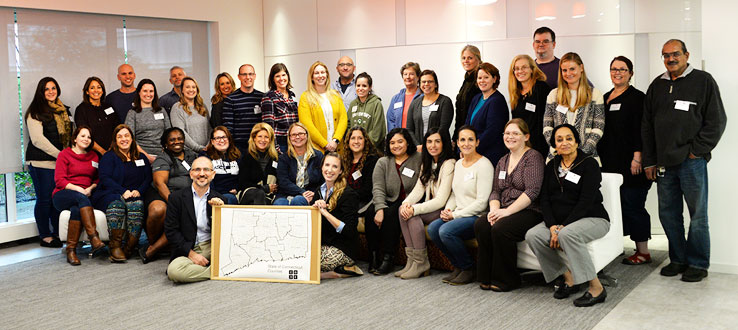SHU in partnership to provide computer science education to K-12 students

Preparing students for a career in computer science may be an ongoing concern dating back a few decades, but there is still a considerable gap in such education when it comes to grades K-12. A new partnership between Sacred Heart University and an organization called Code.org is aiming to change that.
“Part of what we”™re doing, from an educational perspective, is to prepare those students for jobs that don”™t yet exist,” said Darcy Ronan, assistant professor at SHU”™s Isabelle Farrington College of Education, one of two co-directors of the program. “Even if they don”™t end up working directly in a computer science-related field, they will still receive the skills to adapt and problem solve that are so important in the 21st century.”
The Fairfield-based university is the official partner of Code.org in Connecticut, joining a nationwide network that supports efforts to expand access to computer science in K-12 schools.
Based in Seattle, Code.org is a nonprofit dedicated to expanding computer science access to younger students and increasing participation by women and underrepresented minorities, a cohort it says makes up 48 percent of students in its courses. Its vision is to ensure that every student has the chance to learn computer science, as they do biology, chemistry or algebra. The organization provides curricula for K-12 computer science in school districts across the nation.
Through the partnership, Code.org will provide more than $200,000 to fund professional learning programs for teachers through 2020, with SHU”™s Isabelle Farrington College and School of Computer Science and Engineering providing additional matching funds. Workshops will reach more than 100 area teachers each year and will be led by Code.org-trained facilitators, many of whom are local educators.
All Code.org materials are cloud-based, device-agnostic and available free of charge to anyone under a Creative Commons license. They offer three curricula programs: Computer Science Fundamentals, Discoveries and Principles for elementary, middle and high school students, respectively.
Code.org”™s Computer Science Principles is an accredited Advanced Placement (AP) course.
Workshops for elementary school teachers are one day, offered throughout the year. The first, held Nov. 6, was attended by 35 teachers from around the state.
Secondary school teachers attend an intensive week-long summer workshop with four follow-on sessions the following school year.
“Computer science is the curriculum of the 21st century,” said Hadi Partovi, Code.org founder and CEO. “These skills not only provide a pathway to the careers of the future, but a foundation for basic understanding of the technological world around us. We”™re proud to welcome Sacred Heart University as a partner and look forward to supporting their critical work to prepare more teachers to teach computer science.”
Cenk Erdil, assistant professor at SHU”™s School of Computer Science and Engineering who is also co-director of the partnership, noted that Code.org”™s regional initiative began just last year, having previously focused its efforts on TeacherCon, an annual series of week-long summer professional development workshops for new computer-science teachers.
Erdil compared the potential impact of today”™s computer science environment to that of the Industrial Revolution. “Whether it”™s A.I., coding, the cloud or several other areas, technology today is a daily presence in our lives,” he said. “At the college level, it”™s been recognized that computer science is a fundamental skill.”
But that is not always the case for younger students, Ronan noted. Through Code.org and other initiatives, “Students are not only using technology, but creating technology. That”™s a key difference,” she said. “This represents a generational challenge for educators who, by and large, did not have these experiences in our own schooling. Code.org”™s professional learning programs are designed for novice coders. Computer science for all includes teachers, too.”
Erdil said that if educators want to target the next generation of students for advanced subjects, they must do it now because, by the time those students get to college, it might be too late.
Through the partnership with Code.org, SHU also has been working with Connecticut”™s Department of Education and the Connecticut Computer Science Teachers Association to define formal pathways for teachers.
Erdil said that, while SHU”™s program will be fully funded by Code.org for three years, “We want to become a completely self-sufficient program.” With Code.org supported by such donors as Amazon, Facebook, Google, the Infosys Foundation and Microsoft, he said, “We will be reaching out to businesses in our area to help support these programs.”